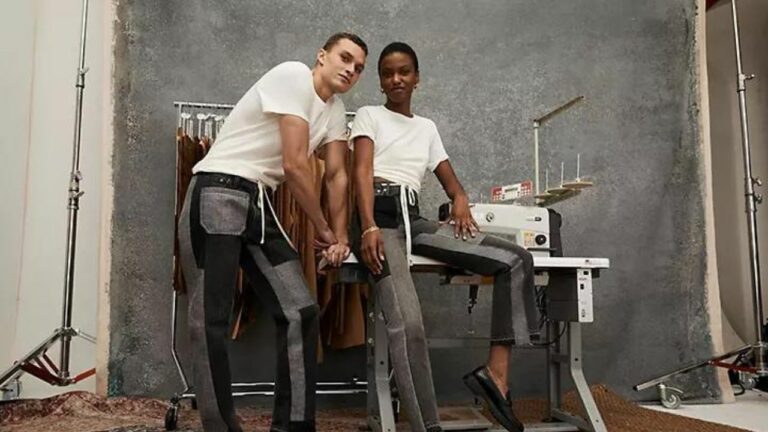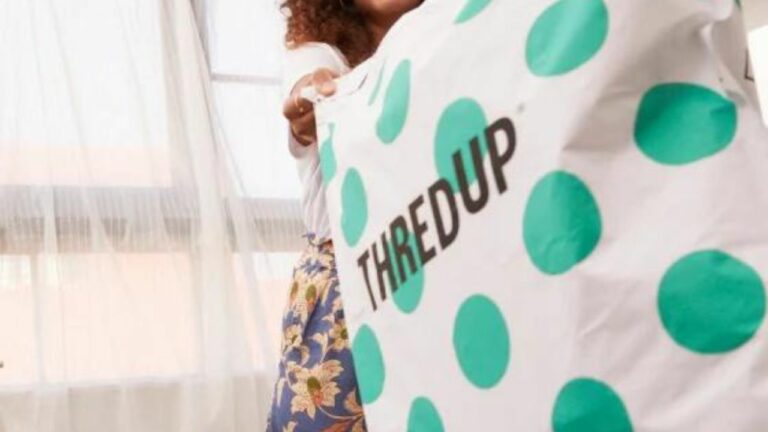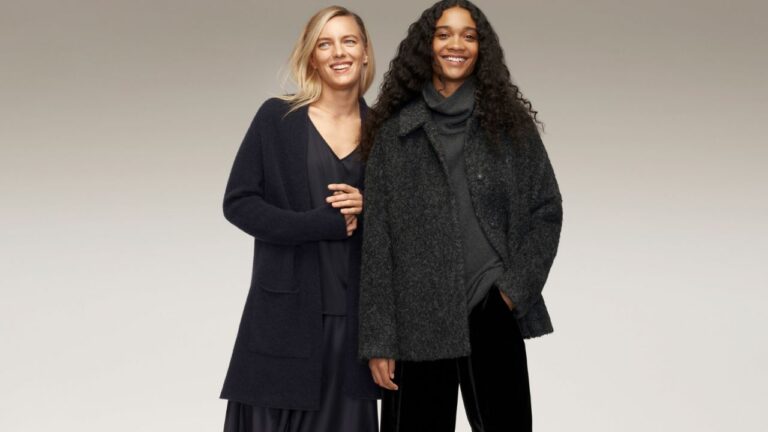We’ve all seen the images of landfills overflowing with discarded clothing. Yikes.
Our unwanted clothes and shoes totaled 13 million tons of waste in landfills in 2018 alone. And, because of the constant supply of cheap, low-quality items from fast fashion brands, that number is growing. It might seem daunting, but simple changes to our shopping habits can make single-use fashion a thing of the past.
Believe it or not, progress is happening. Right now, sustainable clothing brands are fighting excessive clothing production through recycling programs. They’re taking responsibility for their products from end to end and making circular businesses more common. This means when you’re done with your item, you can send it back to be recycled — often for store credit for your next purchase!
Talk about a win-win.
What Is Eco-Friendly Clothing?
While “eco-friendly” may occasionally be used by marketing teams to captivate the eco-conscious demographic, genuine eco-friendly clothing can be distinguished by its substantial efforts to minimize environmental impact. To recognize brands that authentically prioritize sustainability, look for evidence of:
- Mindful design and the use of sustainable or recycled materials,
- Manufacturing processes that are energy-efficient, conserve water, and avoid pollution,
- Plastic free packaging that is either recycled or biodegradable,
- Distribution methods that are efficient and offset carbon emissions.
More and more brands are also turning toward a circular model, taking on the responsibility to collect, reuse, recycle, or safely dispose of their products as part of their commitment to reducing waste.
To guard against greenwashing, scrutinize these practices closely, seeking transparency and tangible actions that reflect a true dedication to eco-friendliness.
What is a circular model in the clothing industry?
A circular model in fashion refers to a sustainable approach where garments are designed to retain maximum value through extended use, and then responsibly returned to the environment at the end of their lifecycle. This model moves away from the traditional “take-make-waste” system, focusing instead on the future use and recyclability of each garment throughout its entire life.
Download our FREE ebook:

Why Is Environmentally Friendly Clothing Important?
Environmentally friendly clothing directly influences the health of our planet and promotes ethical industry practices. Opting for pre-loved or upcycled items drastically reduces emissions and conserves resources, demonstrating the power of consumer choices in fostering sustainable and ethical sustainable fashion brands
- The fashion industry is responsible for 10% of global carbon emissions annually.
- It also produces 20% of the world’s wastewater.
- Many garment workers do not earn a living wage, highlighting the need for ethical considerations in our fashion choices.
- Through mindful purchasing, consumers have the ability to drive change towards more sustainable and fair industry practices.
As for ecommerce businesses, implementing eco-friendly practices, such as recycling programs, supply chain audits, or the use of recycled materials, offers numerous benefits for brands:
- Ensures compliance with environmental regulations, avoiding penalties.
- Opens up new market opportunities with consumers willing to pay more for sustainable products.
- Boosts employee satisfaction and loyalty by aligning with their values.
- Identifies and mitigates risks in the supply chain, securing long-term viability.
12 Eco-Conscious Clothing Brands With A Recycling Program
Sustainable fashion is about more than addressing fashion textiles or products. It describes the products, processes, activities, and actors aimed at achieving a sustainable fashion industry built on equality, social justice, animal welfare, and ecological integrity.
If you’re looking for simple ways to offset your carbon footprint, try supporting sustainable fashion by buying from companies that recycle clothes. We compiled some of our favorite sustainable clothing brands that make shopping for recycled clothing easy.

1. The Reshop by tentree
It’s no secret we love Tentree and its commitment to carbon offsetting. For every item sold, they plant ten mangrove trees to create jobs and capture carbon. Tentree recently launched The Reshop, a platform where you can get store credit for sending in old Tentree clothing. You can also buy overstock and used Tentree clothes at a reduced price.
Re-sale platforms like The Reshop make affordable, ethical clothing attainable for more people. Shoppers can find a range of men’s and women’s casual basics in natural fibers. Sustainable dresses, sweatshirts, and tees are available in sizes XS-XXL.

2. Patagonia’s Worn Wear
Patagonia founder Yvon Chouinard inspired the sustainable apparel community when he gave the company, valued at $3 billion, to a trust. The Holdfast Collective now uses the company’s profits to fight climate change. Patagonia is a leader in sustainability, and its recycling program is no exception. They encourage us to “repair, share, and recycle” our stuff to end excessive consumption.
If you have Patagonia clothes you no longer wear taking up space in your closet, trade them in for store credit. Your old items will find a new life on Worn Wear, where they’ll be re-sold to the next sustainability-minded shopper. The recycled clothing is available in sizes ranging from XXS-XXL for women and XXS-3XL for men. For the eco-conscious kid, they even have infant, toddler, and kids’ size ranges. The whole family can shop pre-loved!

3. Outerworn from Outerknown
Outerknown is “the first fashion brandfounded on a total commitment to sustainability.” Protecting the environment from pollution while designing luxe sustainable clothing is what they’re all about. Since each piece is made with sustainable production methods, you can think of their products as an investment, and that can come at a premium price. Luckily, their recycling program is a great option for people looking for more affordable ethical clothing.
Outerworn is a community where people sell their pre-loved Outerknown items, keeping the clothing in circulation — with over 1,300 garments kept out of landfills to date. Sellers mail their pre-loved clothing right to the buyer, reducing carbon emissions from industrial packaging and shipping in the process.
Shoppers can find men’s hoodies, shirts, sweatpants, shorts, and jeans in sizes S-XXL and women’s shirts, pants, skirts, and dresses in XS-XL.

4. VIVAIA
VIVAIA is a newcomer to sustainable fashion. The US-based company recycles marine plastics and bottles into eco-friendly materials for its sustainable shoes and ethical handbags. — creating a purpose for over 1.8 million used bottles.
Diverting plastic waste from landfills and oceans into versatile accessories for men and women is important to the brand. The company plans to become zero waste as they grow.
VIVAIA carries tote bags, women’s shoes in sizes 5-11 (including half sizes), and men’s shoes in sizes 6.5-10.

5. Madewell
From planting over 15,000 trees via their carbon offsetting campaign on Giving Tuesday to their down alternative made from recycled plastic bottles keeping us warm in the winter — Madewell is one of those brands bringing creativity into sustainability. We love their unique collaboration with Storytellers & Creators, which saved scraps of leftover denim from cutting patterns from the landfill and turned them into a limited-edition collection of outerwear and accessories
If vintage is your thing, Madewell Forever is for you, selling curated vintage clothes and accessories. And since there is nothing better than a broken-in pair of jeans, you can shop for pre-loved Madewell clothing — including their famous denim. The re-sale shop is available in collaboration with ThreadUP, which means you can shop online for pre-loved Madewell clothes from anywhere.

6. For Days
When it’s time for a closet clean-out, grabbing a Take Back Bag from For Days is an easy way to make sure your unwanted clothes get recycled. No matter where you bought them, For Days will repurpose them into new products like insulation, rugs, and cleaning materials. So far, the recycling program has saved 170,000 garments from landfills and turned them into something still useful.
If you’re looking for new casual basics like sustainable dresses made of certified organic cotton, look no further. Designed for circularity, you can find men’s clothing in sizes S-XXL and women’s clothing in XS-XL (sometimes up to 4XL). They also have sustainable shipping options to offset the emissions from your order!

7. ThredUP
We love the variety of brands and styles you can find on ThredUP, an online thrift and consignment store. They’ve got clothing and accessories for women and kids in standard and plus sizes and maternity wear for sustainability-minded moms-to-be.
To understand how sustainable your closet is, try ThredUP’s Fashion footprint calculator. You can find out the carbon cost of your wardrobe and get useful sustainability tips like shopping with brands that repair their items, renting clothing, or reducing your laundry’s impact on the planet. And, of course, buying pre-loved because you reduce carbon emissions by 82% every time you shop second-hand.

8. Pact
Pact is a favorite of our eco-friendly family. Leading by example with transparent products and processes, each item includes climate impact reporting. With fair trade, organic, and sustainable products, they’ve become a go-to sustainable brand for organic athleisure, casual basics, and comfy chic clothing with lines for women, men, maternity, kids, and the home.
The Give Back Box® is Pact’s recycling program. Just pack up your old clothing from any brand and send it off to be donated to their partner charities. Shoppers can feel good about recycling or even buying new from Pact, as they partner with SimpliZero to measure and offset carbon emissions through reforestation, renewables, and projects to remove carbon from the atmosphere.

9. Mara Hoffman
Even designer fashion is going green. Mara Hoffman created the Full Circle Marketplace for the eco-conscious fashionista looking for sustainable ready-to-wear. It’s not just fast fashion that has a waste problem. Designer clothing, while manufactured in far less quantity, has high-fashion followers who tend to replace garments each season.
Shifting to a more sustainable mindset isn’t easy, but designers like Mara Hoffman focus on sustainable materials, processes, and production to extend each garment’s life. The marketplace to buy and sell pre-owned garments is another step toward eco-friendly fashion from the NYC design house.

10. Eileen Fisher
If you’re returning to work in the office, you’re probably in the market for new workwear. Eileen Fisher creates classic, size-inclusive women’s business casual clothing in sizes 0-18 and 16W-24W. Another brand committed to a circular model, Eileen Fisher Renew, launched in 2009. Ahead of its time, the take-back program has recycled 1.9 million garments — either reselling, donating, or turning pieces, not in re-sale condition into art.
In addition, Waste No More, a pioneering initiative by Eileen Fisher, transforms material scraps into accessories, wall hangings, and decorative objects — a unique take on sustainability!

11. Subset
Undergarments have long been ineligible to donate for hygienic reasons. Because of this, all our unwanted socks and underwear end up in the landfill.
Fortunately for folks based in the US, Subset has a Recycling Program for underwear, bras, socks, and tights — men’s and kid’s undies too. The program has turned 1,000,000 items into new materials like insulation, carpet padding, and furniture batting.
When you send your unwanted undies in to be recycled, you get $15 toward your next order. Companies like Subset are leading the way, creating innovative new ways to reduce our waste and give even our panties a second life.

12. MANYMOONS
Another brand with a circular model is MANYMOONS, previously known as Borobabi, which not only is America’s first circular retailer but focuses on creating eco-friendly kid’s fashion. Clothes for kiddos is a high-impact industry simply because they grow so fast! Parents constantly have to replace clothes for their little ones as they age.
That’s where MANYMOON’s rent or recycle program comes in. Shoppers can choose to buy or rent sustainable and ethically produced , certified organickid’s cotton clothing and return it when they’re done. And a bonus? MANYMOONS prides itself on being holistic in its eco-friendly ways, using sustainable, durable material for each item — the clothes are awfully cute too.
You might also wonder…
Shoppers are looking for ways to do more good, but it isn’t always easy. Brands deceiving people about their sustainability through “greenwashing” has become common, making it hard to know who to trust as an eco-conscious consumer.
What clothes are most environmentally friendly?
Fabric, manufacturing, and distribution all factor into how environmentally friendly our clothing is. Green brands like Toad and Co. use sustainable fibers like organic cotton, hemp, linen, and TENCEL® lyocell. When buying organic fiber clothes, check the item is GOTS certified. This shows they’re organic and sustainable throughout their whole supply chain.
Recycled fiber clothing is one sustainable material option. Recycling cotton, wool, and nylon from old garments keep them out of landfills. Growing cotton uses a lot of water and pesticides, so re-using existing fabric is better for the planet.
Did you know we can make fabric out of plastic bottles? It’s true; recycled polyester is a fabric made from plastic bottles cleaned, crushed, and spun into yarn. Even brands like Athleta by Gap Inc., Nike, and H&M create clothing from recycled polyester.
What age range purchases the most eco-friendly clothing brands?
Sustainable fashion is appealing to conscious consumers of all ages. But, Millennials and Gen Z are more likely to shop from eco-friendly clothing brands.
We’ve got the stats to prove it! Forbes found 62% of Gen Z shoppers will pay more for ethical goods from sustainable brands. Business Insider found 67% of Millennials sometimes or always check a brand’s sustainability and ethics practices before buying.
Yet another study showed 70% of Millennials base buying decisions on a company’s environmental focus. So while ecologically responsible brands appeal to all ages, younger shoppers are leading the shift toward sustainability.

Eco Friendly Clothing: The Future of Sustainable Fashion
Join us in demanding better from the brands we buy our clothing from. By choosing to support brands using sustainable production methods, we can put an end to harmful fast fashion.
It’s essential for us to hold brands accountable for their impact on people and the planet. As more companies make it easy and attainable to make sustainable fashion choices, customers won’t shop for brands known for pollution and harmful carbon emissions.
Clothing and apparel brands are catching up with customer expectations. As circular businesses grow, recycled fashion and sustainable shopping are here to stay. And soon, affordable, ethical clothing will be available to everyone.



